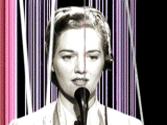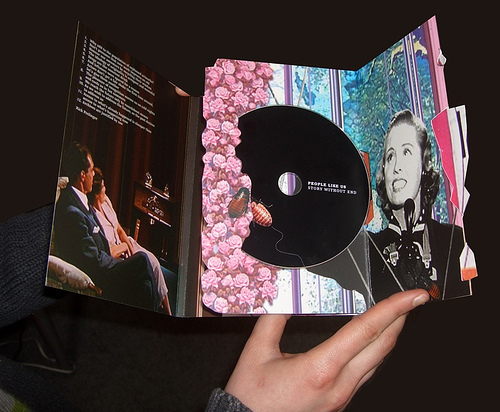Just What Is It That Makes People Like Us So Different, So Appealing?
Drew Daniel
Just What Is It That Makes People Like Us So Different, So Appealing?
Drew Daniel
From “Beware the Whim Reaper” (1995) to “Abridged Too Far” (2004), Vicki Bennett has a way with execrable puns. Confronted with the task of theorizing about what informs and unites the bewildering multiplicity of her life’s work creating painstaking, hilarious and disturbing assemblages out of sound, language and moving image as People Like Us, the title of hers that catches me by the throat is an oldie but a goodie: “Pompous Circumstance”. Wit’s last minute detour off the golden road to cliché, puns take a piece of shared culture and suddenly tweek it into a personal shape, creating something new by revealing what was already there. Inverting Alexander Pope’s formula for poetry (“what oft was thought but ne’er so well expressed”), puns reveal a latent possibility within the given: what oft was expressed but never, until now, brought to thought. Puns are a kind of “black art” that throws received values into reverse: if good puns are bad, then the worst are the best. Ideally, you should be groaning and laughing at the same time. Fair is foul and foul is fair.
Risking a descent into pompous circumstances indeed, the occasion of this retrospective exhibition reverses Vicki’s direction of flow and prompts us to take her sound and video work seriously, and asks us to try to place her work in the context of an ongoing sea-change in how creativity is understood. Pompously put, the artistic re-use of found material confronts us anew with the enigma of creation. Up-ended by indirection, we can only half-see the artist at work in the capricious decision to smash and grab. Looking at the results when the glue has dried and the files have been rendered, can we do any more than catch the shadow of a hand in mid-flight as it grasps and folds a found form, clicks “Crop”, hits “Save”? Trying to catch up, we might ask some simple questions: why isolate and preserve these fragments? Why this piece, placed exactly here? Why this element and not others? Is this a work of love and preservation for what is disappearing, or an act of mockery at the expense of the found? Are we meant to recall the vanished whole, or to see this isolated quanta of material as newly self supporting?
Faced with mounting evidence of collage’s omnipresence and the increasing banalization of cutting and pasting as components of every form of content-management software, it may hurt more now than ever before to return to the old, awkward question: is this creative?
Yodeling in the valley, the fragment oscillates between emotional pitches. When T. S. Eliot wrote “These fragments I have shored against my ruin,” he figured modernist fragmentation as a melancholic funeral rite, a minor key lament at cultural collapse sung against the headwind of history. The irony is that his flimsy barricade of found fragments of popular songs and overheard conversations and quotations proved surprisingly durable; far from a last gasp, it was a breathtakingly successful demonstration of the energies of a new, combinatorial poetics. Jump-cut from Eliot to Dada. Like the public torture of the corpses of suicides in medieval Europe (designed to purge the village of an evil selfishness through a gratuitously “meaningless” display of cruelty), Dada snippetry started as a hostile surgical intervention into a moribund and self-canceling society. The marginal chancers at the Cabaret Voltaire may have thought that their cut-ups of official rhetoric were the final harrowing of necrotic ideological tissue, but Dada collage inadvertently accomplished a revivifying transfusion into the post-war artistic bloodstream. Avant-garde art practices of mangling and attacking and distorting the detritus of mass culture birthed a portable technique of collage that proved all too adaptable to the posterboard and the advertisement and the radio jingle and the TV spot and the viral web campaign. Such are the ironies of what John Ashbery termed “acceptance culture”; the smothering bosom of official sanction muffles the howl of critique with a pillow of puff pieces. For further evidence, consult the PLU track title: “Cushions can Kill”.
Jump-cut to Richard Hamilton. Post-war fragmentation accelerated the centrifugal separation of the positive and negative powers unleashed by cutting up and reassembling culture into both an atomic optimism and an atomic pessimism. If anything could be harvested, shattered into fragments and then recreated for the sake of new art, then the entire archive (sound, image, word) was a standing reserve waiting to be taken by force. Unfortunately, thanks to the accelerating technology of nuclear warfare, this was also true of our own bodies: we were all going to be split apart and reconfigured against our will, and soon. William S. Burroughs’ nostrum “Cut into the present and the future leaks out” figures both the Pandora’s box of potentiality for recombination initiated by a self-consciously mature cut-up aesthetic and the radioactive fallout of anxiety and fear unleashed by a society which had cut into matter itself at its most basic level. We are still living with the results, as lurid narrative scenarios of the endlessly imminent total war choke present reality with a toxic cloud of futurity. Bennett revisits these fantasized bomb-sites and loops them, literally, in the “fort/da” game she plays with animated renderings of atomic explosions that wallpaper the backgrounds of the tank-faced, bighaired women in her video piece “We Edit Life”. Caught in the headlights of these macabre and hilarious people, with each improbable spit curl and passing facial tic replayed and looped into a digital tableaux vivant, we are embarrassed for them and yet find ourselves withering slightly under their artificially steady maternal gaze. In Bennett’s work, the past isn’t suddenly modernized by digital tools, but seems instead rendered even more saturated with the creepy alterity of its very pastness: the syrupy orchestral swells, campfire sing alongs, and outmoded fashions and forced smiles that she assembles and recombines aren’t so much preserved from the ravages of time as they are powerfully fermented in them.
The ability to cut up and transform found material would seem to constitute the ultimate post-modern runaround from older models of artistic expression as a self-revelation. Trading character and depth for a jigsaw surface, collage can seem like a cheap shot detour from being answerable for the self within the work. And yet there is something weirdly self-exposing about the cumulative results of Bennett’s excursions into the mass media archives; the obsessive return to certain images and sounds across decades of work grants them a weirdly personal quality, the fetishistic investment of a cargo cult of one that recognizes the deity of Rod McKuen and Dolly Parton. If it’s so funny, why does it make us feel so awkward? Bennett’s work registers a hot flush of manic exhilaration in the sheer powertrip of her sure technological command over her source material, but it pills the sugar with a certain lingering aftertaste of despair at the failure of the aspirations within the material she collects. If the surreal humor of her work at its lightest suggests the comic English anarchism of Monty Python or Richard Hamilton, the quotidian grimness of her work at its darkest suggests the mordant English miserabilism of Philip Larkin or Mike Leigh. Far from proposing a utopian or psychedelic “other world” of festivity in which to escape from the drabness of the everyday, after prolonged exposure to the alchemical work of Vicki Bennett, we see and hear our own everyday world as one big joke which is already cut to pieces. You’ll laugh, you’ll cry.
Works Cited
William S. Burroughs & Brion Gysin The Third Mind New York: Viking Press, 1978.
T. S. Eliot “What the Thunder Said” The Waste Land and Other Poems. London: Faber and Faber, 1972.
Alexander Pope “An Essay on Criticism” Collected Poems. London: Tuttle Publishing, 1991.
This essay was commissioned by alt.gallery to coincide with “People Like Us: We Edit Life” – a Retrospective of the work of People Like Us, which ran in the gallery from 16 May-12 July 2008. Documentation can be found on the gallery site and here:
http://www.peoplelikeus.org/2008/documentation_of_the_people_like_us_retrospecitve_at_altgallery.html







